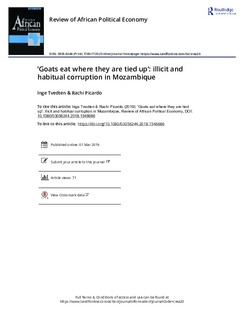| dc.contributor.author | Tvedten, Inge | |
| dc.contributor.author | Picardo, Rachi | |
| dc.date.accessioned | 2019-03-06T15:00:54Z | |
| dc.date.available | 2019-03-06T15:00:54Z | |
| dc.date.issued | 2018-12-01 | |
| dc.identifier | oai:www.cmi.no:6784 | |
| dc.identifier.citation | in Review of African Political Economy vol. 45 no. 158 | |
| dc.identifier.uri | http://hdl.handle.net/11250/2589078 | |
| dc.description.abstract | The article shows that corruption is structural and omnipresent in Mozambican society, effectively legitimising corrupt practices at all levels. Using an anthropological approach, it argues that small-scale corruption has the most immediate effects for the urban and rural poor and is so common that it has become an integrated part of daily life, or 'habitual'. While most of the poor relate to corruption through tacit acceptance and acts of compliance, its practical implications are most severe for the very poorest, who cannot afford to take part in corrupt exchanges and are excluded from vital social relationships and social services. | |
| dc.language.iso | eng | |
| dc.relation | Review of African Political Economy | |
| dc.relation | 158 | |
| dc.relation.ispartof | Review of African Political Economy | |
| dc.relation.ispartofseries | Review of African Political Economy vol. 45 no. 158 | |
| dc.relation.uri | https://www.cmi.no/publications/6784-goats-eat-where-they-are-tied-up | |
| dc.subject | Mozambique | |
| dc.subject | Corruption | |
| dc.subject | Poverty | |
| dc.subject | Social Exclusion | |
| dc.subject | Anthropology | |
| dc.title | 'Goats eat where they are tied up': illicit and habitual corruption in Mozambique | |
| dc.type | Journal article | |
| dc.type | Peer reviewed | |
